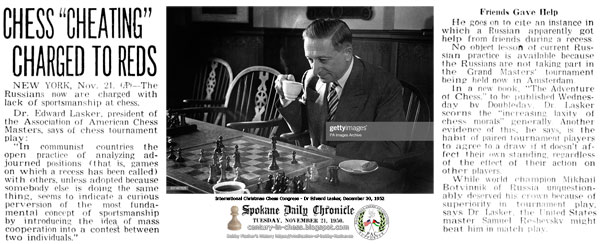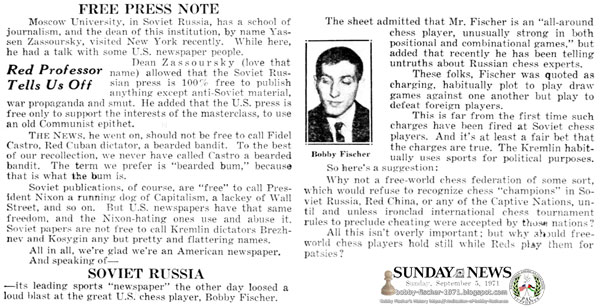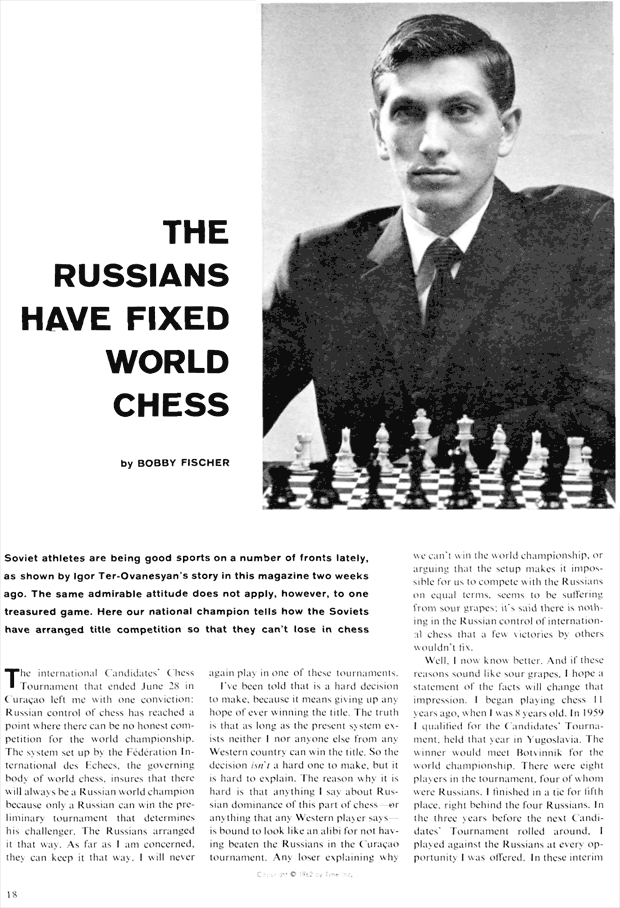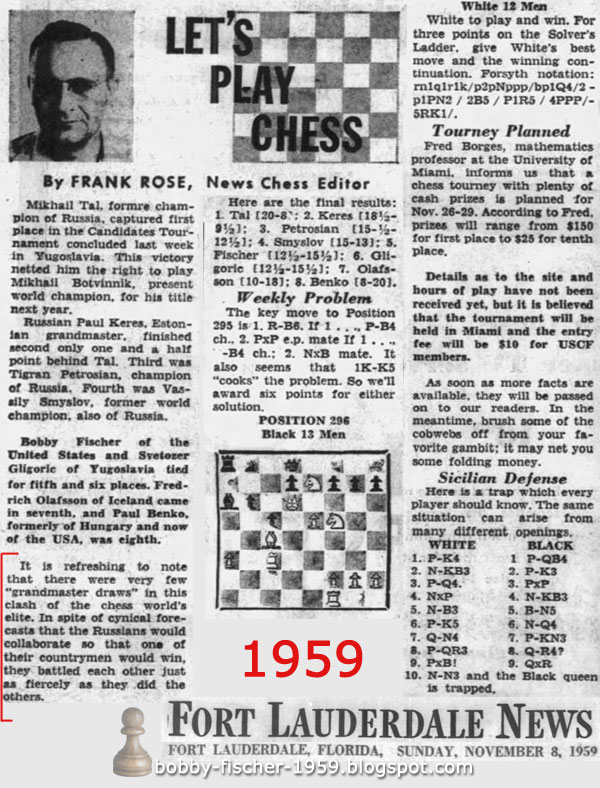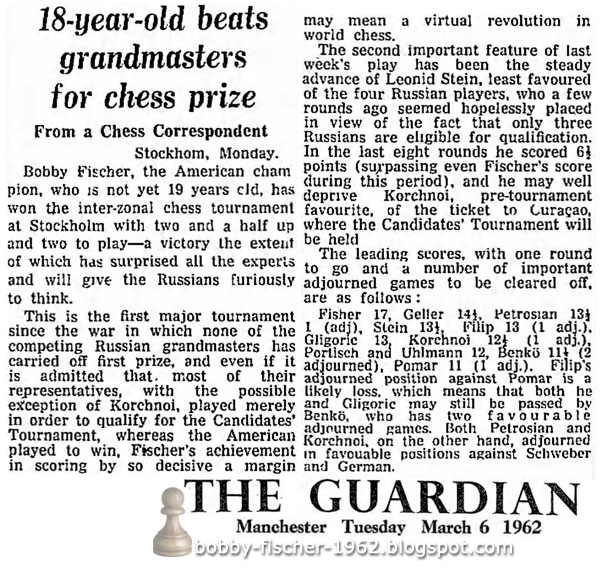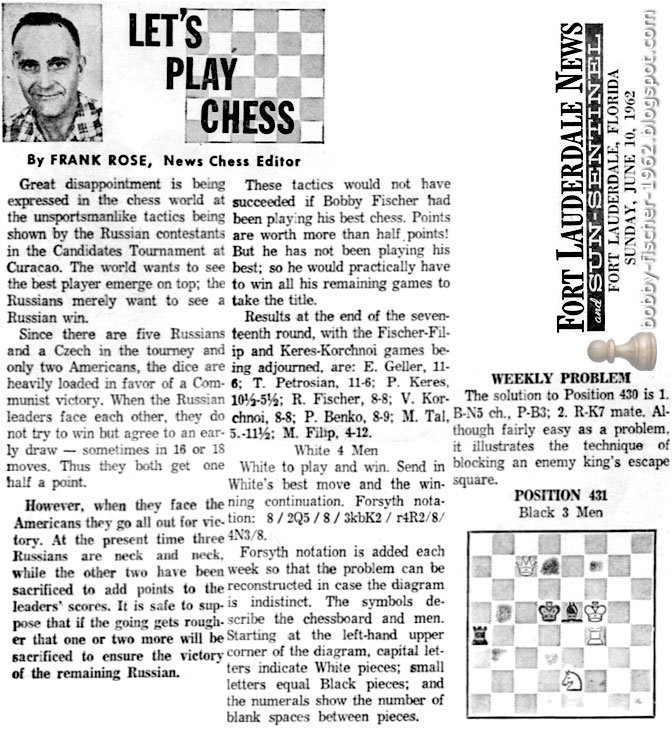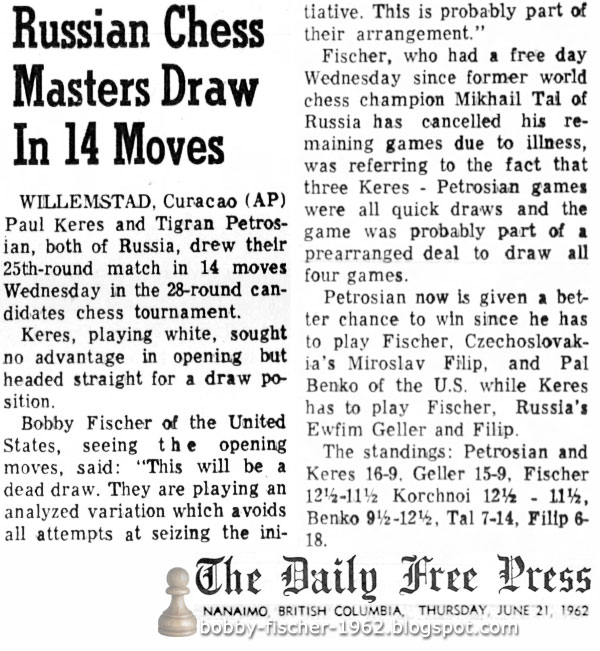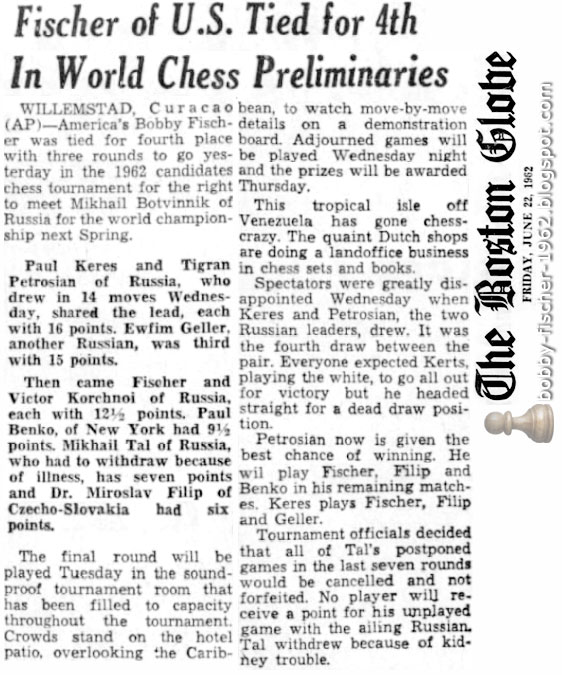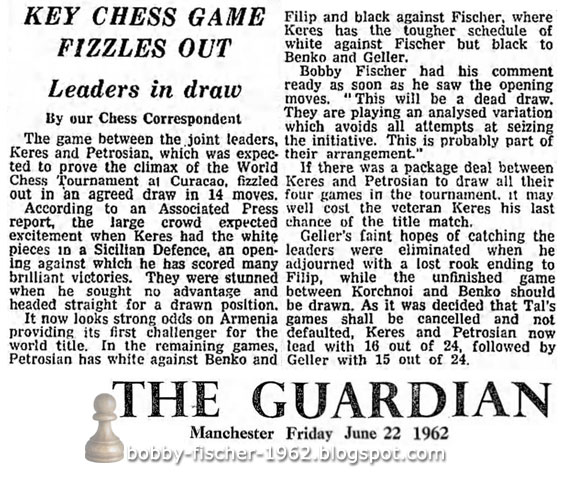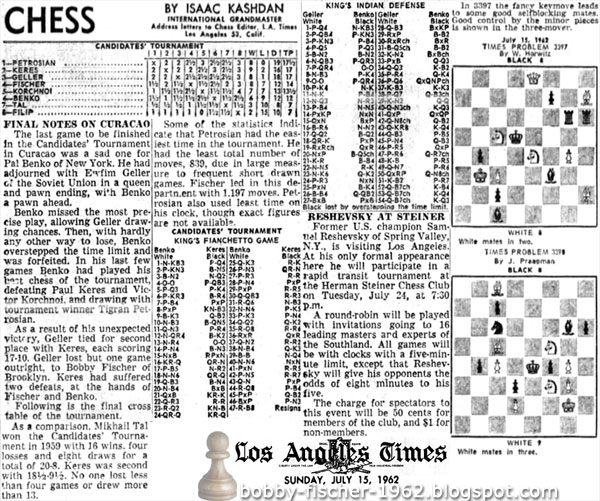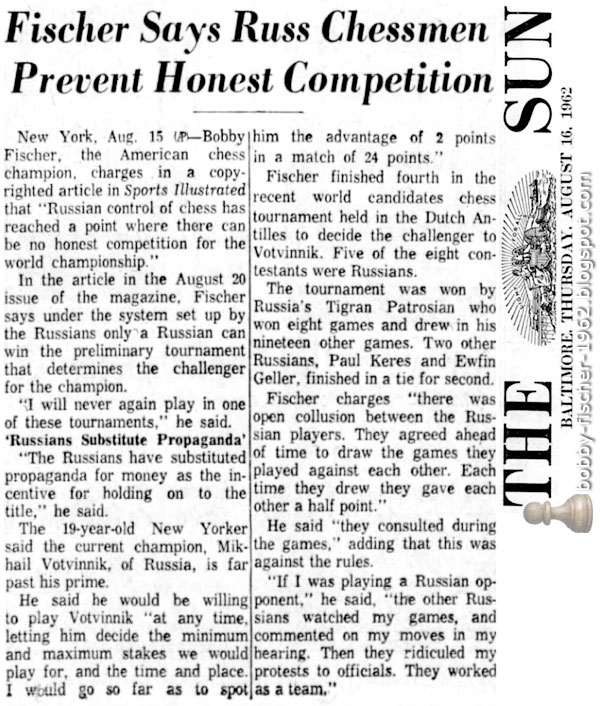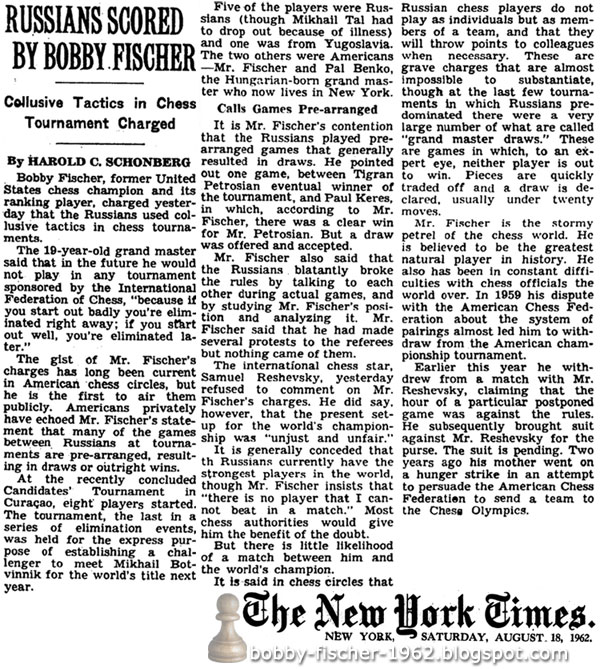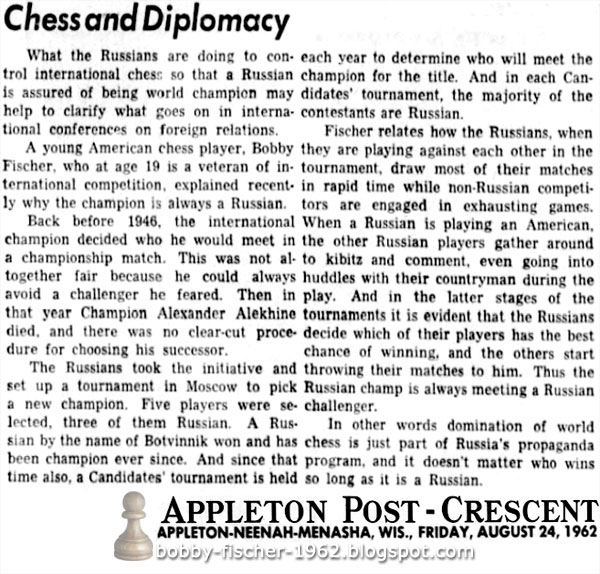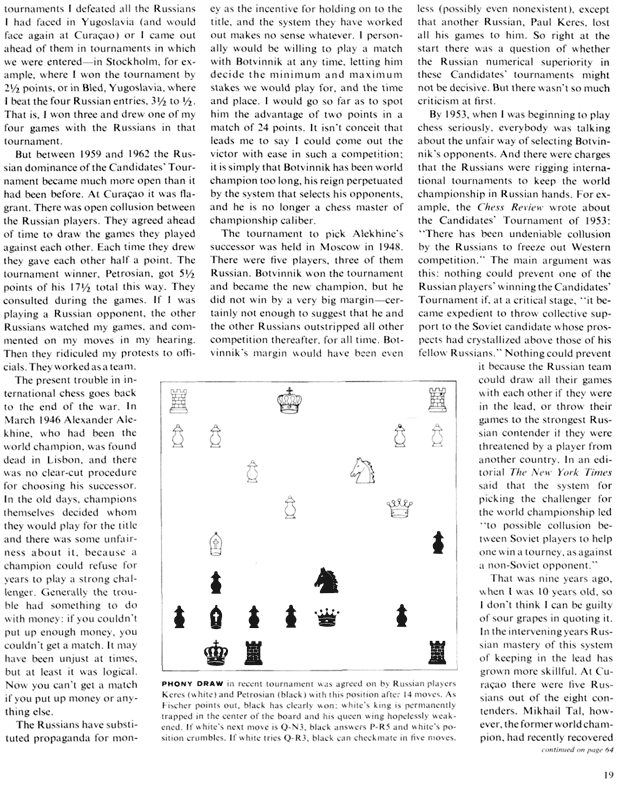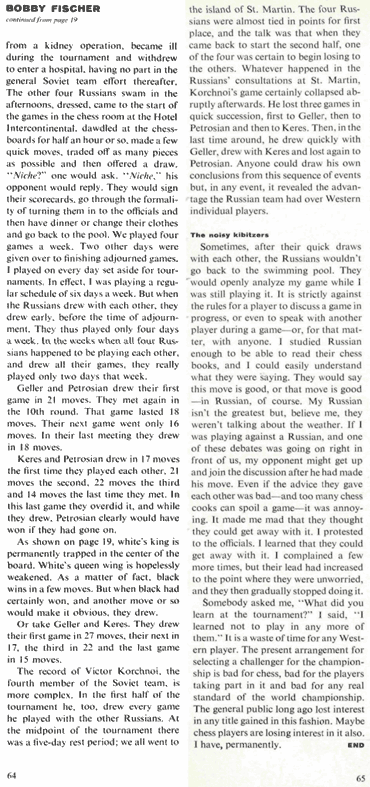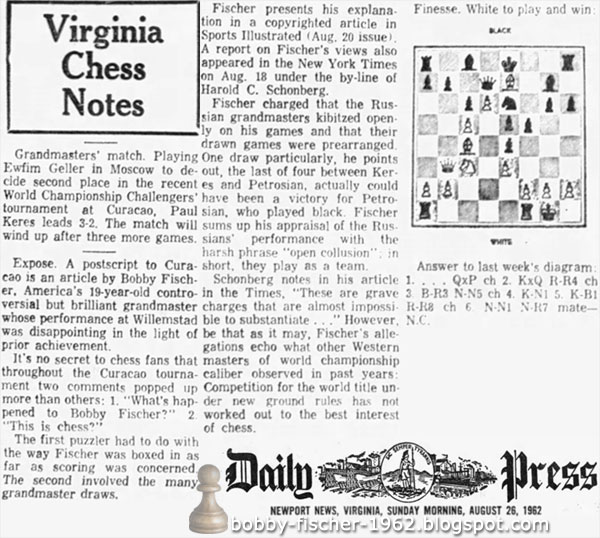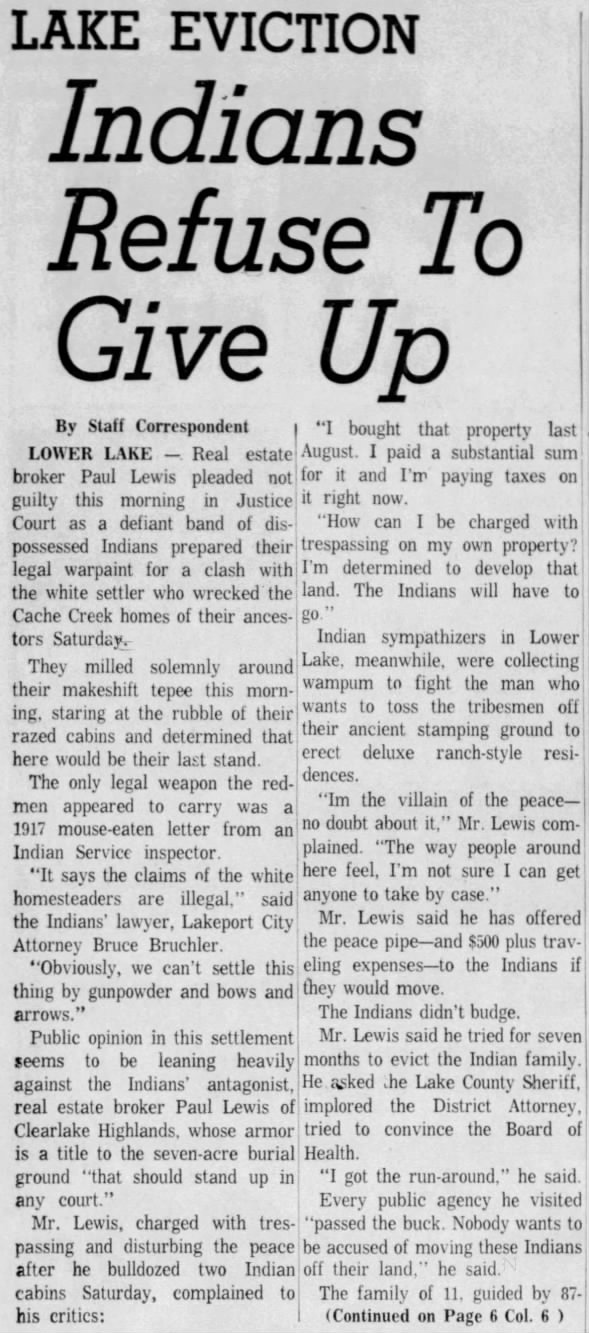Spokane Chronicle Spokane, Washington Tuesday, November 21, 1950 - Page 29 — ★
Chess “Cheating” Charged To Reds — New York, Nov. 21 (AP) — The Russians now are charged with lack of sportsmanship at chess.
Dr. Edward Lasker, president of the Association of American Chess Masters, says of chess tournament play:
“In communist countries the open practice of analyzing adjourned positions (that is, games on which a recess has been called) with others, unless adopted because somebody else is doing the same thing, seems to indicate a curious perversion of the most fundamental concept of sportsmanship by introducing the idea of mass cooperation into a contest between two individuals.”
Friends Gave Help.
He goes on to cite an instance in which a Russian apparently got help from friends during a recess.
No object lesson of current Russian practice is available because the Russians are not taking part in the Grand Masters' tournament being held now in Amsterdam.
In a new book, “The Adventure of Chess,” to be published Wednesday by Doubleday, Dr. Lasker scorns the “increasing laxity of chess morals” generally. Another evidence of this, he says, is the habit of paired tournament players to agree to a draw if it doesn't affect their own standing, regardless of the effect of their action on other players.
While world champion Mikhail Botvinnik of Russia unquestionably deserved his crown because of superiority in tournament play, says Dr. Lasker, the United States master Samuel Reshevsky might beat him in match play.
Daily News New York, New York Sunday, September 05, 1971 - Page 22 ★
Free Press Note : Soviet Russia
it's leading sports “newspaper” the other day loosed a loud blast at the great U.S. chess player, Bobby Fischer.
The sheet admitted that Mr. Fischer is an “all around chess player, unusually strong in both positional and combinational games,” but added that recently he has been telling untruths about Russian chess experts.
These folks, Fischer was quoted as charging, habitually plot to play draw games against one another but play to defeat foreign players.
This is far from the first time such charges have been fired at Soviet chess players. And it's at least a fair bet that the charges are true. The Kremlin habitually uses sports for political purposes.
So here's a suggestion:
Why not a free-world chess federation of some sort, which would refuse to recognize chess “champions” in Soviet Russia, Red China, or any of the Captive Nations, until and unless ironclad international chess tournament rules to preclude cheating were accepted by those nations?
All this isn't overly important; but why should free-world chess players hold still while Reds play them for patsies?
1953, Philadelphia Inquirer, Chess Problems by Bill Ruth, and just happened to cross the January 04, 1953 column — discussing Soviet CHEATING, “Grandmaster Draws”. This was not “News” when Bobby Fischer finally brought worldwide focus on Soviet chicanery. Soviets went into a tailspin and dropped the dirty propaganda bomb on Bobby Fischer!
The Philadelphia Inquirer Philadelphia, Pennsylvania 04 Jan 1953, Sunday
For rest of Bill Ruth's 1953 column.
- Alexander Bisno, Beverly Hills, Calif.
The Philadelphia Inquirer Philadelphia, Pennsylvania January 11, 1953
Bobby Fischer wrote, “The Russians Have Fixed World Chess” in Sports Illustrated 1962, explaining these “Grandmaster Draws” and vowed not to compete in such rigged matches. The Soviet Propaganda Ministry came after him with barrels loaded… accusing “insane” “unpredictable” “temperamental” “paranoid” et cet
Victoria Advocate Victoria, Texas Monday, October 30, 2006
Did the Soviets Cheat at Chess During the Cold War? It all adds up, researchers conclude.
Now, two Washington University economics professors say they have strong evidence, with the help of statistics, that the game indeed has not always been pure.
Their study suggest that chess players in the former Soviet Union colluded by taking early draws against each other to increase the chances of Soviet success in international competitions.
Suspicions of Soviet scheming during the Cold War are not new and perhaps not surprising since the Soviets dominated the game at that time. In fact, the great American player Bobby Fischer noted a couple of decades ago that in one tournament, Soviets called a draw in every game against each other.
John Nye says the study he authored, along with Charles Moul, is the first to give mathematical proof of the collusion. They have presented their findings at academic conferences.
In the study, which is still being peer reviewed and considered for publication, Nye and Moul analyzed the results of 4,366 games from 1940 to 1964. They compared the matches of qualifying tournaments for the world championship to those in all-Soviet tournaments.
After some statistical calculations, they observed that the average number of draws-matches that end without a winner-among Soviet players skyrocketed in international competitions. They also found that the average number of moves in those games was lower in international matches - suggesting that Soviet players agreed to stop the game early, before it was clear that there would be a stalemate.
Another finding: Soviet players performed better in international competitions than would be expected by their records. The Washington University economists guess that the players were performing better because they saved energy and time from ending the matches against other Soviets early so they could focus more on their international competitors.
Nye said his study leaves little doubt in his mind that the Soviets were colluding. But what has not been resolved - and perhaps never will be since most of the players of that era are now dead - is whether it was government-sponsored or a more informal arrangement between compatriots. ([Easy. Win or get dragged on the carpet. Taimanov and Petrosian could've told all about the reward for losing.])
"It could have been casual, or it could have been official," Nye said.
Taylor Kingston, a chess history buff who frequently writes articles for chess Web sites, said the study gives "mathematical muscle" to the "widely believed" idea that there was Soviet collusion.
 Did the Soviets Cheat at Chess During the Cold War? It all adds up, researchers conclude. 30 Oct 2006, Mon Victoria Advocate (Victoria, Texas) Newspapers.com
Did the Soviets Cheat at Chess During the Cold War? It all adds up, researchers conclude. 30 Oct 2006, Mon Victoria Advocate (Victoria, Texas) Newspapers.com
This article refers to the same “Grandmaster Draws” Bobby Fischer refers to in his Sports Illustrated article “The Russians Have Fixed World Chess”:
The Guardian London, Greater London, England Tuesday, March 06, 1962 - Page 5 (★)
18 Year Old Beats Grandmasters For Chess Prize
Stockholm, Monday.
“...This is the first major tournament since the war in which none of the competing Russian grandmasters has carried off first prize, and even if it is admitted that most of their representatives, with the possible exception of Korchnoi, played merely in order to qualify for the Candidates' Tournament, whereas the American played to win. Fischer's achievement in scoring by so decisive a margin may mean a virtual revolution in world chess...”
Fort Lauderdale News Fort Lauderdale, Florida Sunday, June 10, 1962 - Page 68 (★)
Great disappointment is being expressed in the chess world at the unsportsmanlike tactics being shown by the Russian contestants in the Candidates Tournament at Curacao. The world wants to see the best player emerge on top; the Russians merely want to see a Russian win.
Since there are five Russians and a Czech in the tourney and only two Americans, the dice are heavily loaded in favor of a Communist victory. When the Russian leaders face each other, they do not try to win but agree to an early draw — sometimes in 16 or 18 moves. They they both get one half a point.
However, when they face the Americans they go all out for victory. At the present time three Russians are neck and neck, while the other two have been sacrificed to add points to the leaders' scores. It is safe to suppose that if the going gets rougher that one or two more will be sacrificed to ensure the victory of the remaining Russian.
These tactics would not have succeeded if Bobby Fischer had been playing his best chess. Points are worth more than half points! But he has not been playing his best; so he would practically have to win all his remaining games to take the title.
Results at the end of the seventeenth round, with the Fischer-Filip and Keres-Korchnoi games being adjourned, are: E. Geller, 11-6; T. Petrosian, 11-6; P. Keres, 10½-5½; R. Fischer, 8-8; V. Korchnoi, 8-8; P. Benko, 8-9; M. Tal, 5-11½; M. Filip, 4-12.
The “Grandmaster Draws” which Bobby Fischer refers to in Sports Illustrated August 19, 1962, “The Russians Have Fixed Chess” is the same topic of discussion in both 1959 and 1962 (above), Fort Lauderdale News Fort Lauderdale, Florida Sunday, June 10, 1962 chess column by Frank Rose. These Soviet maneuvers were a well known fact, long before Bobby Fischer brought such publicity to it… and due to Fischer's protests, rules were later changed.
Bobby's growing disillusionment with the “Soviet Grandmaster Draws”…
Nanaimo Daily News Nanaimo, British Columbia, Canada Thursday, June 21, 1962 - Page 3 (★)
Russian Chess Masters Draw In 14 Moves
Willemstad, Curacao (AP) Paul Keres and Tigran Petrosian, both of Russia, drew their 25th-round match in 14 moves Wednesday in the 28-round candidates chess tournament.
Keres, playing white, sought no advantage in opening but headed straight for a draw position.
Bobby Fischer of the United States, seeing the opening moves, said: “This will be a dead draw. They are playing an analyzed variation which avoids all attempts at seizing the initiative. This is probably part of their arrangement.”
Fischer, who had a free day Wednesday since former world chess champion Mikhail Tal of Russia has cancelled his remaining games due to illness, was referring to the fact that three Keres-Petrosian games were all quick draws and the game was probably part of a prearranged deal to draw all four games.
Petrosian now is given a better chance to win since he has to play Fischer, Czechoslovakia's Miroslav Filip, and Pal Benko of the U.S. while Keres has to play Fischer, Russia's Ewfim Geller and Filip.
The standings: Petrosian and Keres 16-9, Geller 15-9, Fischer 12½-11½ Korchnoi 12½ - 11½, Benko 9½-12½, Tal 7-14, Filip 6-18.
Even the fans were feeling cheated by the Russian “Grandmaster Draws”
The Boston Globe Boston, Massachusetts Friday, June 22, 1962 - Page 8 (★)
Fischer of U.S. Tied for 4th In World Chess Preliminaries
Willemstad, Curacao (AP)—America's Bobby Fischer was tied for fourth place with three rounds to go yesterday in the 1962 candidates chess tournament for the right to meet Mikhail Botvinnik of Russia for the world championship next Spring.
Paul Keres and Tigran Petrosian of Russia, who drew in 14 moves Wednesday, shared the lead, each with 16 points. Ewfim Geller, another Russian, was third with 15 points.
Then came Fischer and Victor Korchnoi of Russia, each with 12½ points. Paul Benko, of New York had 9½ points. Mikhail Tal of Russia who had to withdraw because of illness, has seven points and Dr. Miroslav Filip of Czechoslovakia had six points
The final round will be played Tuesday in the sound-proof tournament room that has been filled to capacity throughout the tournament. Crowds stand on the hotel patio, overlooking the Caribbean, to watch move-by-move details on a demonstration board. Adjourned games will be played Wednesday night and the prizes will be awarded Thursday.
This tropical isle off Venezuela has gone chess-crazy. The quaint Dutch shops are doing a land-office business in chess sets and books.
Spectators were greatly disappointed Wednesday when Keres and Petrosian, the two Russian leaders, drew. It was the fourth draw between the pair. Everyone expected Keres, playing the white, to go all out for victory but he headed straight for a dead draw position.
Petrosian now is given the best chance of winning. He will play Fischer, Filip and Benko in his remaining matches. Keres plays Fischer, Filip and Geller.
Tournament officials decided that all of Tal's postponed games in the last seven rounds would be cancelled and not forfeited. No player will receive a point for his unplayed game with the ailing Russian. Tal withdrew because of kidney trouble.
The Guardian London, Greater London, England Friday, June 22, 1962 - Page 2(★)
Key Chess Game Fizzles Out: Leaders in Draw
The game between the joint leaders, Keres and Petrosian, which was expected to prove the climax of the World Chess Tournament at Curacao, fizzled out in an agreed draw in 14 moves.
According to an Associated Press report, the large crowd expected excitement when Keres had the white pieces in a Sicilian Defence, an opening against which he has scored many brilliant victories. They were stunned when he sought no advantage and headed straight for a drawn position.
It now looks strong odds on Armenia providing its first challenger for the world title. In the remaining games, Petrosian has white against Benko and Filip and black against Fischer, where Keres has the tougher schedule of white against Fischer but black to Benko and Geller.
Bobby Fischer had his comment ready as soon as he saw the opening moves. “This will be a dead draw. They are playing an analysed variation which avoids all attempts at seizing the initiative. This is probably part of their arrangement.”
If there was a package deal between Keres and Petrosian to draw all their four games in the tournament, it may well cost the veteran Keres his last chance of the title match.
Geller's faint hopes of catching the leaders were eliminated when he adjourned with a lost rook ending to Filip, while the unfinished game between Korchnoi and Benko should be drawn. As it was decided that Tal's games shall be cancelled and not defaulted, Keres and Petrosian now lead with 16 out of 24, followed by Geller with 15 out of 24.
The Los Angeles Times Los Angeles, California Sunday, July 15, 1962 - Page 52 (★)
Final Notes On Curacao
The last game to be finished in the Candidates' Tournament in Curacao was a sad one for Pal Benko of New York. He had adjourned with Ewfim Geller of the Soviet Union in a queen and pawn ending, with Benko a pawn ahead.
Benko missed the most precise play, allowing Geller drawing chances. Then, with hardly any other way to lose, Benko overstepped the time limit and was forfeited. In his last few games Benko had played his best chess of the tournament, defeating Paul Keres and Victor Korchnoi, and drawing with tournament winner Tigran Petrosian.
As a result of his unexpected victory, Geller tied for second place with Keres, each scoring 17-10. Geller lost but one game outright, to Bobby Fischer of Brooklyn. Keres had suffered two defeats, at the hands of Fischer and Benko.
Following is the final cross table of the tournament.
As a comparison, Mikhail Tal won the Candidates Tournament in 1959 with 16 wins, four losses and eight draws for a total of 20-8. Keres was second with 18½-9½. No one lost less than four games or drew more than 13.
Some of the statistics indicate that Petrosian had the easiest time in the tournament. He had the least total number of moves, 839, due in large measure to frequent short drawn games. Fischer led in this department with 1,197 moves. Petrosian also used least time on his clock, though exact figures are not available.
“After he was assured of victory, Petrosian said, ‘This was the hardest tournament I ever played in and I attribute victory to the fact that I am 15 years younger than Keres.’”
Russians Keep Monopoly On Chess Championships
Nanaimo Daily News Nanaimo, British Columbia, Canada Thursday, June 28, 1962 - Page 13 (★)
“Some of the statistics indicate that Petrosian had the easiest time in the tournament. He had the least total number of moves, 839, due in large measure to frequent short drawn games. Fischer led in this department with 1,197 moves. Petrosian also used least time on his clock, though exact figures are not available.”
-Isaac Kashdan, Chess Grandmaster, Los Angeles Times, July 15, 1962
The Baltimore Sun Baltimore, Maryland Thursday, August 16, 1962 - Page 31 (★)
Fischer Says Russ Chessmen Prevent Honest Competition
New York, Aug. 15 (AP)—Bobby Fischer, the American chess champion, charges in a copyrighted article in Sports Illustrated that “Russian control of chess has reached a point where there can be no honest competition for the world championship.”
In the article in the August 20 issue of the magazine, Fischer says under the system set up by the Russians only a Russian can win the preliminary tournament that determines the challenger for the champion.
“I will never again play in one of these tournaments,” he said.
‘Russians Substitute Propaganda’
“The Russians have substituted propaganda for money as the incentive for holding on to the title,” he said.
The 19-year-old New Yorker said the current champion, Mikhail Botvinnik, of Russia, is far past his prime.
He said he would be willing to play Botvinnik, “at any time, letting him decide the minimum and maximum stakes we would play for, and the time and place. I would go so far as to spot him the advantage of 2 points in a match of 24 points.”
Fischer finished fourth in the recent world candidates chess tournament held in the Dutch Antilles to decide the challenger to Botvinnik. Five of the eight contestants were Russians.
The tournament was won by Russia's Tigran Petrosian who won eight games and drew in his nineteen other games. Two other Russians, Paul Keres and Ewfim Geller, finished in a tie for second.
Fischer charges “there was open collusion between the Russian players. They agreed ahead of time to draw the games they played against each other. Each time they drew they gave each a half point.”
He said “they consulted during the games,” adding that this was against the rules.
“If I was playing a Russian opponent,” he said, “the other Russians watched my games, and commented on my moves in my hearing. Then they ridiculed my protests to officials. They worked as a team.”
New York Times, New York, New York, Saturday, August 18, 1962 - Page 17 (★)
Russians Scored By Bobby Fischer
—
Collusive Tactics in Chess Tournament Charged
—
By Harold C. Schonberg
Bobby Fischer, former United States chess champion and its ranking player, charged yesterday that the Russians used collusive tactics in chess tournaments.
The 19-year-old grand master said that in the future he would not play in any tournament sponsored by the International Federation of Chess, “because if you start out badly you're eliminated right away; if you start out well, you're eliminated later.”
The gist of Mr. Fischer's charges has long been current in American chess circles, but he is the first to air them publicly. Americans privately have echoed Mr. Fischer's statement that many of the games between Russians at tournaments are pre-arranged, resulting in draws or outright wins.
At the recently concluded Candidates' Tournament in Curacao, eight players started. The tournament, the last in a series of elimination events, was held for the express purpose of establishing a challenger to meet Mikhail Botvinnik for the world's title next year.
Five of the players were Russians (though Mikhail Tal had to drop out because of illness) and one was from Yugoslavia. The two others were Americans —Mr. Fischer and Pal Benko, the Hungarian-born grand master who now lives in New York.
Calls Games Pre-arranged
It is Mr. Fischer's contention that the Russians played pre-arranged games that generally resulted in draws. he pointed out one game, between Tigran Petrosian eventual winner of the tournament, and Paul Keres, in which, according to Mr. Fischer, there was a clear win for Mr. Petrosian. But a draw was offered and accepted.
Mr. Fischer also said that the Russians blatantly broke the rules by talking to each other during actual games, and by studying Mr. Fischer's position and analyzing it. Mr. Fischer said that he had made several protests to the referees but nothing came of them.
The international chess star, Samuel Reshevsky, yesterday refused to comment on Mr. Fischer's charges. He did say, however, that the present setup for the world's championship was “unjust and unfair.”
It is generally conceded that the Russians currently have the strongest players in the world, though Mr. Fischer insists that “there is no player that I can not beat in a match.” Most chess authorities would give him the benefit of the doubt.
But there is little likelihood of a match between him and the world's champion.
It is said in chess circles that Russian chess players do not play as individuals but as members of a team, and that they will throw points to colleagues when necessary. These are grave charges that are almost impossible to substantiate, though at the last few tournaments in which Russians predominated there were a very large number of what are called “grand master draws.” These are games in which, to an expert eye, neither player is out to win. Pieces are quickly traded off and a draw is declared, usually under twenty moves.
Mr. Fischer is the stormy petrel of the chess world. He is believed to be the greatest natural player in history. He also has been in constant difficulties with chess officials the world over. In 1959 his dispute with the American Chess Federation about the system of pairings almost led him to withdraw from the American championship tournament.
Earlier this year he withdrew from a match with Mr. Reshevsky, claiming that the hour of a particular postponed game was against the rules. He subsequently brought suit against Mr. Reshevsky for the purse. The suit is pending. Two years ago his mother went on a hunger strike in an attempt to persuade the American chess Federation to send a team to the Chess Olympics.
The Post-Crescent Appleton, Wisconsin Friday, August 24, 1962 - Page 4 (★)
Chess and Diplomacy
What the Russians are doing to control international chess so that a Russian is assured of being world champion may help to clarify what goes on in international conferences on foreign relations.
A young American chess player, Bobby Fischer, who at age 19 is a veteran of international competition, explained recently why the champion is always a Russian.
Back before 1946, the international champion decided who he would meet in a championship match. This was not altogether fair because he could always avoid a challenger he feared. Then in that year Champion Alexander Alekhine died, and there was no clear-cut procedure for choosing his successor.
The Russians took the initiative and set up a tournament in Moscow to pick a new champion. Five players were selected, three of them Russian. A Russian by the name of Botvinnik won and has been champion ever since. And since that time also, a Candidates' tournament is held each year to determine who will meet the champion for the title. And in each Candidates' tournament, the majority of the contestants are Russian.
Fischer relates how the Russians, when they are playing against each other in the tournament, draw most of their matches in rapid time while non-Russian competitors are engaged in exhausting games. When a Russian is playing an American, the other Russian players gather around to kibitz and comment, even going into huddles with their countryman during the play. And in the latter stages of the tournaments it is evident that the Russians decide which of their players has the best chance of winning, and the others start throwing their matches to him. Thus the Russian champ is always meeting a Russian challenger.
In other words domination of world chess is just part of Russia's propaganda program, and it doesn't matter who wins so long as it is a Russian.
Daily Press Newport News, Virginia Sunday, August 26, 1962 - Page 14 (★)
Expose.
A postscript to Curacao is an article by Bobby Fischer, America's 19-year-old controversial but brilliant grandmaster whose performance at Willemstad was disappointing in the light of prior achievement.
It's no secret to chess fans that throughout the Curacao tournament two comments popped up more than others: 1. “What's happened to Bobby Fischer?” 2. “This is chess?”
The first puzzler had to do with the way Fischer was boxed in as far as scoring was concerned. The second involved the many grandmaster draws.
Fischer presents his explanation in a copyrighted article in Sports Illustrated (Aug. 20 issue). A report on Fischer's views also appeared in the New York Times on Aug. 18 under the by-line of Harold C. Schonberg.
Fischer charged that the Russian grandmasters kibitzed openly on his games and that their drawn games were prearranged. One draw particularly, he points out, the last of four between Keres and Petrosian, actually could have been a victory for Petrosian, who played black. Fischer sums up his appraisal of the Russians' performance with the harsh phrase “open collusion”; in short, they play as a team.
Schoenberg notes in his article in the Times, “These are grave charges that are almost impossible to substantiate . . .” However be that as it may, Fischer's allegations echo what other Western masters of the world championship caliber observed in past years: Competition for the world title under new ground rules has not worked out to the best interest of chess.
I hope everyone catches that. Professor Fauber seems to think Bobby Fischer's perception of being a target of discrimination and treated badly was -->"rather realistic" <-- in parenthesis. What did Fauber know, that a lot of politically biased propagandists seem oblivious to, today? Well, as I've pointed out from contemporaries, there was blanket antisemitic discrimination by organizers against Bobby Fischer's religious observance of the Saturday sabbath. That's a good start . . . organizers disrespecting a man's religious faith THEN turn around and print lies in the newspapers, radio, television, books claiming he had the “problem” and ‘threw a temper tantrum’ because he refused to work on his sabbath.
I hope everyone caught that. Professor Fauber seems to think Bobby Fischer's perception of being a target of...
Posted by Bobby Fischer's True History on Wednesday, November 18, 2020
Soviet Machinery went into full damage control when Fischer alleged such things in Sports Illustrated... till this day, those "old hands" of the establishment persist in their denial, defending their carefully crafted, but crumbling Soviet illusions
 Chess Draw Warnings Are Handed Out 07 Jan 1969, Tue Asbury Park Press (Asbury Park, New Jersey) Newspapers.com
Chess Draw Warnings Are Handed Out 07 Jan 1969, Tue Asbury Park Press (Asbury Park, New Jersey) Newspapers.com
Chess Draw Warnings Are Handed Out
Hastings, England (AP)—The controller of the Times and Hastings International Chess Congress warned competitors yesterday against fixing drawn games—apparently after a draw between two Russian masters.
In the eighth round Sunday former world champion Vassily Smyslov, 47, and 22-year-old Vladimir Tumakov agreed to a draw after 27 minutes play.
W. Ritson Morry, games controller and international judge, warned the players:
“So far this congress has mercifully not produced the lamentable state of affairs which we witnessed last year, and most of the games have produced good fighting chess.
“Nevertheless, in rounds six and eight there occurred two short draws between leading players which, while not as yet suggestive of any general or drawing conspiracy, are not of the sporting standard which the many visitors to this congress have a right to expect.”
Morry threatened to declare both players losers if it was clear that a draw had been prearranged.
The Russians made no comment about the criticism of their drawn game.
Smyslov gave his own reply in the ninth round by efficiently disposing of Cenek Kottnauer of Britain in 24 moves in three hours of play.
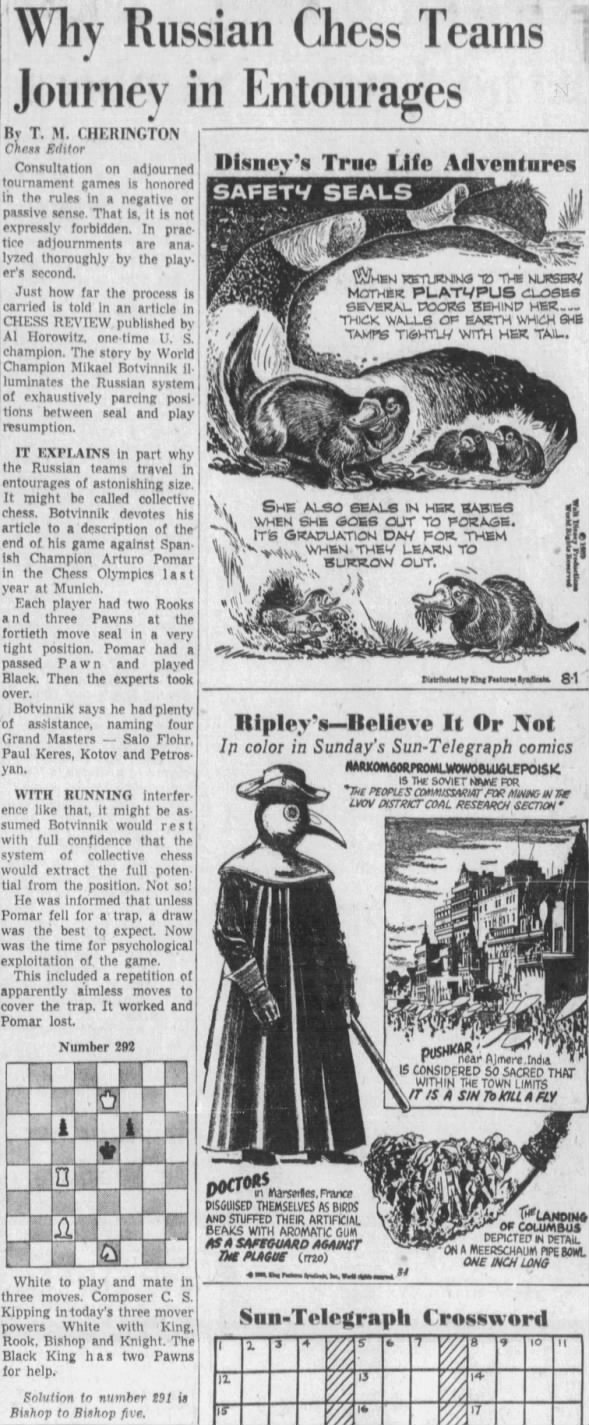 World of Chess 01 Aug 1959, Sat Pittsburgh Sun-Telegraph (Pittsburgh, Pennsylvania) Newspapers.com
World of Chess 01 Aug 1959, Sat Pittsburgh Sun-Telegraph (Pittsburgh, Pennsylvania) Newspapers.com
World of Chess by T. M. Cherington, Chess Editor
Why Russian Chess Teams Journey in Entourages
Consultation on adjourned tournament games is honored in the rules in a negative or passive sense. That is, it is not expressly forbidden. In practice adjournments are analyzed thoroughly by the player's second.
Just how far the process is carried is told in an article in CHESS REVIEW published by Al Horowitz, one-time U.S. champion. The story by World Champion Mikhail Botvinnik illuminates the Russian system of exhaustively parcing positions between seal and play resumption.
IT EXPLAINS in part why the Russian teams travel in entourages of astonishing size. It might be called collective chess. Botvinnik devotes his article to a description of the end of his game against Spanish Champion Arturo Pomar in the Chess Olympics last year at Munich.
Each player had two Rooks and three Pawns at the fortieth move seal in a very tight position. Pomar had a passed Pawn and played Black. Then the experts took over.
Botvinnik says he had plenty of assistance, naming four Grand Masters — Salo Flohr, Paul Keres, Kotov and Petrosyan.
WITH RUNNING interference like that, it might be assumed Botvinnik would rest with full confidence that the system of collective chess would extract the full potential from the position. Not so!
He was informed that unless Pomar fell for a trap, a draw was the best to expect. Now was the time for psychological exploitation of the game.
This included a repetition of apparently aimless moves to cover the trap. It worked and Pomar lost.











